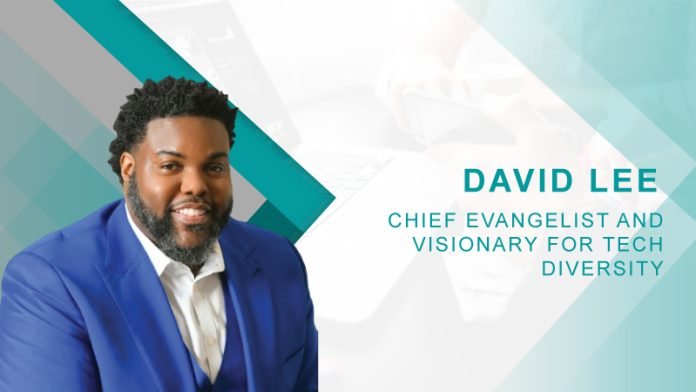David, kindly elaborate on your role as Chief Evangelist and Visionary for tech diversity.
My role is quite simple. Say the quiet part out loud. Talk about the challenges we have in the tech industry around diversity and do so in a way that fosters conversation.
David, please discuss the challenges faced by Black households in terms of income loss from tech jobs and the potential impact on the economic well-being of Black communities.
There is a significant gap in the representation of Black individuals in the tech industry. According to McKinsey, Black households stand to lose over $350 billion in tech job wages by 2030, due to the lack of opportunities and representation in this sector. Combine that with the alarming stats around Black Americans’ net worth, plus the projected rise in tech jobs as the dominant workforce in the US, and these equal trouble for Black Americans.
How can companies create environments that are more inclusive and anti-racist to foster a sense of belonging among Black employees?
It all starts with intent. Companies must actually want to solve this problem and dedicate resources to solving the problem. It starts with taking an assessment of the current situation. What does your current pipeline of talent look like? Where do you go to fill that pipeline? What “culture” have you created at your organization? These are just a few of the questions to start asking and answering for companies to begin the process of creating a more inclusive environment.
Given the challenges in education for minorities, particularly Black individuals from low-income families, how can the tech industry contribute to reducing barriers and providing opportunities for them to access IT courses and pursue careers in technology?
In this digital and social media age, the ability to learn new skills online is like none we’ve ever seen. Companies can sponsor online introductory courses that are accessible to everyone. I looked at what MIT did with https://ocw.mit.edu/. Companies can create something very similar.
With the anticipated increase in the wage gap for Black individuals in tech, how can the tech industry proactively address this issue and ensure fair compensation for all employees, regardless of their racial or ethnic background?
This goes back to creating a diverse pipeline of talent and making sure that you are widening your selection base. Too many times companies get stuck in recruiting from the area that’s around them, especially in Silicon Valley. Creating relationships with professional organizations and conferences that cater to Black professionals as well as HBCUs can help companies create pipelines of talent.
How does increasing Black representation in the tech industry lead to the creation of more inclusive technologies with transformative potential for Black communities?
It leads thereby having more people from the community in the room. Giving their unique input and perspective on how a product will be used and received.
In what ways can a diverse workforce contribute to innovative progress and substantial growth for tech companies, and why is diversity crucial for ensuring lasting change in the industry?
A more diverse workforce means more ideas and more perspectives on how to create a product. You’ll find an even further niche that you can market to and create solutions for. At the end of the day, it’s people behind the tech that we use every day. It’s a thought by someone to solve a problem that they see. Well, when the people creating the products only see things one way, then those are the solutions we get.
How can the tech industry enhance its support for Historically Black Colleges and Universities (HBCUs) and Black tech organizations to nurture and attract Black talent?
GET INVOLVED. Host information sessions, hackathons, and pizza parties. Just be on the campus and create relationships with the students and professors.
Considering the ongoing demand for skilled professionals, especially in specialized fields like computer science, how can the tech industry balance this need with the imperative for diversity?
It all comes back to the pipeline in my eyes. Companies need to do the work upfront by investing resources (that’s both time and money) into connecting with organizations and universities early to get more people involved in the tech space.
What specific measurable goals and metrics do you recommend tech companies set to track their progress in improving diversity and inclusion within their organizations?
I would take a play from the NFL’s playbook and capture the metrics around current positions held by Black employees and contrast that to the number of Black candidates in the pipeline. Focus on increasing the number in the pipeline to ensure more opportunities are there.
In conclusion, how can individuals, organizations, and the tech industry collaborate to bring about positive and lasting changes in diversity and inclusion?
We bring about change by talking about it. This conversation doesn’t have to be adversarial, it will be uncomfortable, and that’s OK. But we change it by not accepting the status quo and continuing to challenge ourselves to do better.
Explore HRtech News for the latest Tech Trends in Human Resources Technology.

David Lee Chief Evangelist and Visionary for Tech Diversity
David Lee transitioned from a software engineering background to become a harbinger of change and inclusivity in the tech world. With over two decades of experience, he has left his mark on government agencies, Fortune 500 companies, and numerous fields, specializing in identity and access management. Recognizing that for technology to truly transform the world, it must embrace diversity, David serves as an agent of transformation, inspiring individuals to unlock their full potential. His influential voice and actionable insights have solidified his reputation as a respected figure in the ever-evolving tech landscape. When he speaks people listen. He is The Identity Jedi.












